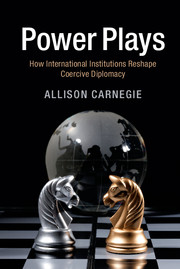Book contents
- Frontmatter
- Contents
- Figures
- Tables
- Acknowledgments
- 1 Introduction
- 2 Theoretical Framework
- 3 Bilateral Agreements and State Similarity
- 4 WTO Membership as a Commitment Strategy
- 5 Coercive Diplomacy in Comparative Perspective
- 6 Agreements and the Displacement of Coercion
- 7 Reduced Effectiveness of Coercion: Evidence from the United States
- 8 Conclusion
- Bibliography
- Index
7 - Reduced Effectiveness of Coercion: Evidence from the United States
Published online by Cambridge University Press: 05 November 2015
- Frontmatter
- Contents
- Figures
- Tables
- Acknowledgments
- 1 Introduction
- 2 Theoretical Framework
- 3 Bilateral Agreements and State Similarity
- 4 WTO Membership as a Commitment Strategy
- 5 Coercive Diplomacy in Comparative Perspective
- 6 Agreements and the Displacement of Coercion
- 7 Reduced Effectiveness of Coercion: Evidence from the United States
- 8 Conclusion
- Bibliography
- Index
Summary
The theoretical account provided in this study posits that political hold-up problems represent a central feature of interstate relations. Although international institutions can help to solve them, spurring investment, they displace coercive behavior into other policy areas. The statistical evidence shown in the previous chapters comports with the hypotheses developed in the formal model. Nonetheless, questions may remain regarding the underlying mechanism at work. In this chapter, I thus turn to a qualitative assessment of the process driving states’ observed behavior and test an additional observable implication of the model.
In particular, in addition to the argument presented thus far, the theoretical account developed in Chapter 2 also clarifies the impact of international institutions on their members’ abilities to exercise coercive diplomacy. This question is particularly important as states hold memberships in numerous international institutions, and yet they still seek to exert influence over other members. However, the theoretical framework showed that these institutions reduce their members’ capacities for coercion. The model specifically predicted that whereas non-WTO members may rely on both trade and other tools to influence their partners, WTO members face higher costs from using trade for coercion against other WTO members. Because members rely less on a key source of leverage, these members should forfeit some coercive power.
This chapter integrates this additional insight with the findings from previous chapters to demonstrate how the model's many predictions all work together to explain the interplay between international institutions and coercive diplomacy. I focus in particular on coercion in the domain of human rights, showing that WTO membership diminishes states’ capacities to influence their partners’ human rights records. However, my purpose is not to develop a full theory of human rights treatment; rather, the limited objective is to demonstrate that accepting trade constraints limits leverage over human rights, with potential negative implications for human rights outcomes. Analyzing the causal relationship between WTO membership and human rights outcomes more generally is beyond the scope of my analysis.
- Type
- Chapter
- Information
- Power PlaysHow International Institutions Reshape Coercive Diplomacy, pp. 129 - 154Publisher: Cambridge University PressPrint publication year: 2015



